- Home
- Lisa Smedman
Apparition Trail, The Page 7
Apparition Trail, The Read online
Page 7
I also found in my cabin a hymnbook that a previous passenger had left behind. Glancing inside the cover, I found it was inscribed with the words “Frederick Baldwin.” I wondered if it had been lost or left behind deliberately, for the solace and edification of the next passenger. I shrugged and set it aside.
The few times that I did venture out onto the promenade that encircled the cabins on the second deck, a curious event repeated itself. More than once as I leaned against the rail, staring at the tree-dotted banks of the river and enjoying a pipe, I would imagine that someone was calling my name. When I turned, it was always to find the same pair of dark, brooding eyes staring at me. Then the gentleman they belonged to would tip his hat, as if in apology, and move on.
The first time this happened I ignored it, thinking it merely a flight of fancy. I was standing near the stern on the first day of our journey, and the sloshing of the perpetual motion tank and the rumbling and squeaking of the gears and cogs it drove produced a cacophony that could have given rise to any number of imagined sounds.
The second time, I intended to ask the fellow his name, but was distracted when the North West ran aground on yet another sand bar. I was jostled by the sudden stop and nearly lost my footing. By the time I regained my balance, the stranger was gone.
These groundings were an all-too-frequent occurrence. It didn’t seem to matter that a man was stationed on the bow of the riverboat, constantly measuring the depth of water with a pole; so silt-laden and unpredictable in its depth was the river that the ship grounded several times each day. When this happened, two beams — much like the ones used in lifting heavy cargoes — had their ends lowered into the water on either side of the vessel. The paddlewheel would churn up great clouds of silt, forcing the vessel forward and causing it to rise on these spars like a lame man on crutches. Having gained a few feet, the boat would then heave down again, and the process would be repeated.
The third time I imagined a voice silently calling me and noticed the same fellow staring at me intently, I made a careful study of the man. He was a handsome fellow in his twenties, wearing a black derby hat, a button cutaway suit, and stylish pants cut from diagonal-patterned worsted. He carried an umbrella with a silver handle, which he used like a cane as he strolled the decks, and he wore his beard below the chin, with cheeks clean-shaven except where the beard joined the moustache on his lip. His black hair glistened with Brilliantine, and his eyes were a brown so dark it bordered on black. He smelled of German cologne.
I strode up to the fellow and demanded his name and business. He introduced himself as Arthur Chambers, and seemed surprised that I had not heard of him. It seemed he was a famous lecturer, although he was vague on his area of expertise, saying only that he lectured on “energy.” I decided that he must be both wealthy and arrogant — two factors that I have often found go hand in glove. I made up my mind to dislike him, then and there. Yet something compelled me to engage him in conversation.
Chambers spoke with a gentleman’s accent, and was obviously from England. But despite his strange habit of startling me, and despite his obvious displeasure at my not recognizing his name, our conversation was civil enough. It was limited to the pleasantries that strangers typically exchange: complaints about the heat, observations on how odd the moon was looking these days, and platitudes about the scenery that passed by on either side. When it came down to it, I could find nothing suspicious about him, save for his seeming fascination with me.
After that, although Chambers kept a discreet distance, he continued to stare intently at me whenever our paths crossed — which was frequently, on a boat of that size. Although he remained silent, he seemed to be speaking volumes with his eyes.
Such constant attention made me uncomfortable, and by the third day of our voyage I made up my mind to confront Chambers about it. Yet it was he who approached me that evening, asking if I liked to play cards. Partially out of politeness, but more out of curiosity about this irritating fellow, I agreed to join him in a game.
As is often the case when cards are suggested, the game of choice was poker. We chose a table in the saloon, beneath the tinkling chandelier. We were soon joined by a soft-spoken farmer from the Red River Settlement who only parted his lips to puff on a white clay pipe, indicating silently with his fingers how many cards he wanted. His breath had a sour smell, and the few times he opened his mouth I could see that one of his teeth had turned black. Also joining us was the Metis steward of the riverboat. The latter fellow, who had the rather pretentious name Xavier de Mont-Ferron, had a boisterous, jovial nature.
We played several hands, and as I settled into the game, my usual lucky streak emerged.
“Mon dieu!” the steward exclaimed when I won for the fourth time in as many hands of cards. “You must ’av a lucky ’orseshoe in your pocket, monsieur.”
“Nothing so crude as that, I’ll wager,” Chambers said, his dark eyes studying me intently. “I’d wager that a power other than mere luck is at work here.”
Suddenly uncomfortable, I slid a finger under my collar to loosen it.
The steward frowned in puzzlement, and the farmer ignored the exchange, silently concentrating on the cards he was shuffling. I was just working up the nerve to ask Chambers what he meant by his remark when a voice drawled from behind my left shoulder: “Y’all mind if I join the game?”
I turned and saw an American with weathered cheeks and a patchy, straw-coloured beard. He wore canvas trousers, a grey cotton shirt that laced up the front, and beaded, ankle-high moccasins. He smelled like a man who had been on the trail for many weeks. A short-barrelled pocket revolver was holstered butt-forward on his left hip, and on his right hip was a sheath containing a knife with an antler handle. I’d noticed him on the lower deck when I boarded in Fort Pitt; he hadn’t taken a cabin, and was sleeping with the half-breeds down below. Given his weapons — and his squint-eyed, challenging stare — I was loath to have him join our poker game. But Chambers waved to an empty chair and invited him to sit down.
“I don’t think I’ve made your acquaintance, sir,” Chambers said with a polite smile, half rising from his chair. “Might I inquire as to your name and where you are from?”
The American pulled his chair up to the table, then reached inside his shirt for a metal flask. Grabbing one of the glasses on the table, he poured the residue of cold tea it held onto the floor, then refilled the glass with amber liquid, measuring the amount by holding his four fingers against the glass and stopping when the liquid was level with the uppermost finger. Judging by the smell, it was whiskey.
He screwed the lid back on his flask and shoved it back into the folds of his odorous shirt. That done, he stared at me, as if challenging me to uphold the law that prohibited possession of alcohol without a permit. I met his eye with a level stare, and he at last answered the Englishman’s question.
“Four Finger Pete’s my name, and I come from here and there — most lately, Fort Garry. I’ll play until my drink is done, then quit the game, win or lose.” His look suggested that he intended to win — and that we’d better like it when he did.
I’d met men like him before, and had even been forced to draw my revolver on them a time or two. I considered myself a match for this Four Finger Pete. Yet Steele had instructed me not to draw any attention to myself while on this case. I had to satisfy myself with giving the uncouth fellow a glare, and leave it at that.
We played six more hands of poker, three of which I won. As coins and twenty-five-cent shinplaster bills piled up in front of me I saw a spark of anger ignite in Four Finger Pete’s eye. I deliberately lost the next hand, not wanting to provoke a confrontation with the American gunslinger. Shaking my head as if bewildered by my change of luck, I secretly sighed in relief as Four Finger Pete scooped up the pot, which had grown to a substantial eight dollars and fifty cents. I could see by his confident attitude that he was used to winning, and guessed that he was a professional gambler. I’d have loved to have taken him
down a notch or two — something that would have been easy, given my luck at cards — but Steele’s admonition to remain inconspicuous kept ringing through my thoughts.
Chambers was the next to deal. He picked up the cards I had thrown away in that last hand: two queens — and the cards that had been in my hand: a queen, a six, two threes and an ace — and glanced at them as he slid them into the deck.
“Quite a pity, Corporal Grayburn,” he said, clucking his tongue. “If only you’d known that lady luck was coming your way, things might have gone quite differently.” His long-lashed eyes blinked innocently, but I had caught the inflection in his voice. Somehow he had recognized my talent for intuitively knowing which cards to toss away, and he’d guessed that I’d deliberately ignored it on that last hand.
Chambers dealt a fresh hand. The farmer stared at his cards from under the brim of his slouch hat, took a deep draw on his pipe and let out a stream of pungent smoke that smelled like Fon du Lac Cut Plug, then held up a tobacco-stained forefinger for one card. Xavier, after a quick wave at the chief engineer to indicate that he would return to his duties presently, shrugged and drew four new cards. Four Finger Pete studied the farmer’s eyes closely, watched Xavier as he reordered the cards in his hand, gave me a sidelong glance, then asked for two cards. His overall expression did not change as he was dealt them, but I saw a small tic at the corner of his scruffy moustache that might have been a smile.
I was about to toss away the jack, queen and king of hearts that were in my hand — in direct defiance of my strong hunch that they were the cards to keep — but just at that moment an Indian woman entered the saloon from the door nearest the stairway that led to the lower deck. I recognized her by the ochre-painted leggings and American blanket she wore as a Peigan. The hood of her blanket was thrown back, revealing lustrous black hair that hung in two braids, into one of which was tied a bedraggled white feather. She had high cheekbones and long-lashed eyes and was quite beautiful — or would have been, I noted as she drew closer, but for the pockmarks that marred her skin. Given the degree to which the disease had ravaged her features, I judged she was lucky to have survived her brush with smallpox. I was struck by her damaged beauty, and captivated by the shine in her hair. She reminded me — albeit only superficially — of an Indian woman who had for a time haunted my dreams, causing me at least upon one occasion to wake up with a palpitating heart. I found myself feeling a pang of guilt, but at the same time was strangely aroused. I found my eyes lingering on this Indian woman. I kept imagining touching her braid, her cheek, her breast….
Feeling myself begin to blush, I deliberately turned my thoughts away from these dream memories. I continued to watch the Indian woman approach out of the corner of my eye, however. I had the distinct impression that she and I were not strangers to one another, even though I was certain we had never met before. I was struck with the peculiar notion that our paths would cross again in the future. But the feeling was gone in a twinkling, and before I could ponder it further the woman approached Four Finger Pete from behind and laid a hesitant hand on his sleeve.
The gambler whirled in his chair like a man challenged to a duel, closing up the cards in his rough hands. “What you doin’ up on this deck?” he barked. “I thought I told you to stay below.”
The woman cringed and glanced down at her moccasins. I noted that one of her pretty eyes had a slight smudge of yellow around it, probably an old bruise. “Child has fever,” she said in a voice as soft as a whisper. She gave the briefest possible glance at the pile of winnings that sat in front of Four Finger Pete. “Medicine at Victoria Mission. When boat stop there, we go—”
The crack of Four Finger Pete’s hand across her face rocked the woman’s head to the side. I was halfway out of my seat, a protest on my lips, when the woman caught my eye and shook her head, her eyes wide and frightened. I could see that it would go badly for her later if I provoked her husband’s anger further. Much as I would have loved to give the fellow a taste of his own medicine, I forced myself to refrain from raining blows upon him.
With narrowed eyes, the gambler gave the woman a look of pure venom. “I told you never to interrupt me when I’m gamblin’,” he growled. “Now git off down below, unless you want me to toss in your worthless hide to sweeten up the pot.”
The woman’s hands clenched, then she turned and hurried away. Feeling my face flush, I leaned across the table in a threatening manner. “You brute,” I growled. “If you strike her again, I’ll arrest you and clap you into manacles. Then I’ll see how well you can sw—”
I felt Chambers’s hand on my arm, and suddenly realized that not only were the others at our table staring at me, but so was everyone else in the saloon. One or two were backing carefully away as Four Finger Pete’s right hand drifted down toward his left hip, where his revolver was holstered.
The gambler’s eyes were dangerously narrow. “I paid that squaw’s father two good ponies and a rifle. She’s mine, bought and paid for. I do with her as I like.”
Anger boiled inside me like a thunderhead, and only with the greatest difficulty did I keep it in check. I reminded myself that I myself was no saint — I’d broken the heart of a decent woman when I broke off my engagement to Mildred Hughes, five years ago, to join the North-West Mounted Police. She’d no other fault but to be too plain for my tastes, and yet I’d shattered her dreams of marriage and broken her heart.
I reminded myself that there were many other men equally as vile as Four Finger Pete. I’d seen cruel things done to Indian women during my time in the North-West Territories, especially by the traders who smuggle whisky into the country, and who would force a woman — or even a young girl — to debase herself for the stuff. Even the honest traders would casually abandon their Indian wives when they return east, leaving these poor women to struggle on alone to feed the brood of children the traders have sired.
Many of the Indian tribes treated their women no better: among the Blood Indians, a woman who had sexual relations outside of wedlock could, according to Indian custom, be disfigured by her husband. I’d seen one poor wretch who suffered this fate: a once-pretty woman with a gaping hole where her nose had been hacked off by a knife. Despite my urgings, she had refused to give evidence against the man who had so disfigured her. I’d taken the law into my own hands then, and dispensed justice with my own two fists — but that was in the past. I was working for Q Division now. And Steele was a man I didn’t want to disappoint.
Chambers tugged at my sleeve. “Please, Corporal, do sit down,” he said in a falsely cheerful voice. “There’s no harm in a man chastising his wife, and we’ve yet to finish our poker hand. How many cards would you like?”
I shook off his hand, angry that Chambers had taken the side of the American lout, then forced myself to take my seat. I did my best to swallow my emotion, and felt a familiar clench of pain in my stomach. Still glaring at Four Finger Pete, who had at last relaxed and moved his hand back to the table, I threw down my discards.
“Two,” I gritted.
Chambers dealt me two cards, then drew one card himself. Not caring who saw it, I reached into my pocket and drew out my bottle of painkiller. Taking a hefty swig, I winced as it burned its way down. The stuff was nineteen per cent alcohol — very nearly a match for the whisky in Four Finger Pete’s glass. As it hit my stomach it burned for a moment, but then I derived some relief from it. I noticed that Chambers glanced thoughtfully at the bottle, then studied my face intently. I hoped he was trying to guess what cards I held, and not what malaise plagued me.
The steward opened with a fifty-cent bid, and the farmer matched it, as did Four Finger Pete. I spread open my cards to look at them, then covered my reaction to what I saw by coughing as if the patent medicine had caught in my throat. Then I carefully arranged my features as if I were hiding a severe disappointment.
“Five dollars,” I said when it was my turn, bidding an outrageous sum. It was just the sort of bid a novice gambler would make w
hen the only avenue open to him is to bluff.
Chambers shrugged and met my bid. The steward uttered an exclamation in French and threw down his hand. “Ees too rich for me,” he said.
The farmer studied his cards carefully, then without a word folded his hand and laid it on the table. He leaned back to watch the rest of us, puffing on his pipe.
Four Finger Pete glanced sidelong at me, and a light came into his eyes. “I’ll see that bet,” he said, tossing five dollars onto the table.
Chambers also remained in the game. “I’ll raise you a dollar,” he said. Four Finger Pete met the dollar and raised the pot two dollars more.
I took another swig of the painkiller, easily swallowing the by-now-familiar mix of camphor, myrrh, and spruce oil, then met the other players’ bets and raised them another dollar. Chambers quickly followed, once again adding a one-dollar raise to keep the bidding going, as did Four Finger Pete. When I increased my “bluff” by another two dollars, and then by another four, both kept pace. Only when I upped it by another five dollars did Chambers drop out.
Four Finger Pete laid a five-dollar bill on the table. “Call,” he said with a smirk. He laid down four nines and a two.
Slowly, all the while ready to lunge at the gambler and grab his hand if he tried to draw his weapon, I lay down my cards: the ten, jack, queen, king, and ace of hearts.
The eyes of the farmer widened. He slid his chair away from the table, putting distance between himself and Four Finger Pete. The steward leaped to his feet and hurried out of the saloon, muttering about needing to tend to his duties.
For a moment, there was frozen silence. Four Finger Pete and I stared at each other, each waiting for the other to blink, while Chambers sat with a bemused expression, as if he’d expected this all along.
“Damn you!” Four Finger Pete shouted at last. His hand swept down — but not for his gun. Instead he picked up his glass and drained the whisky in it in one gulp. He slammed the empty glass back down on the table.

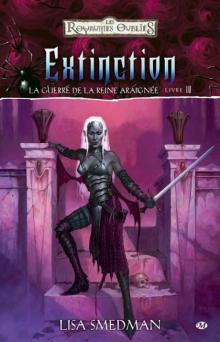 Extinction
Extinction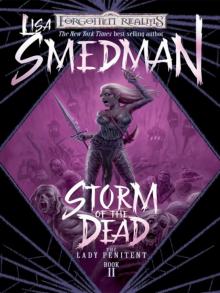 Storm of the Dead
Storm of the Dead Blood Sport
Blood Sport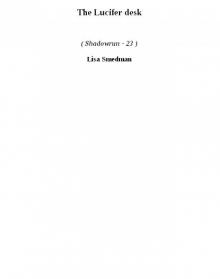 The Lucifer desk (s-2)
The Lucifer desk (s-2)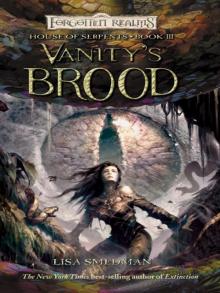 Vanity's Brood
Vanity's Brood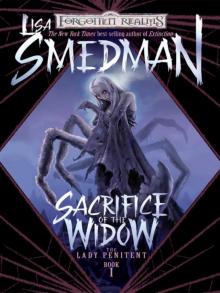 Sacrifice of the Widow
Sacrifice of the Widow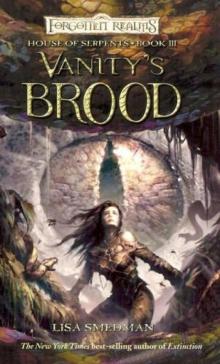 Vanity's brood hos-3
Vanity's brood hos-3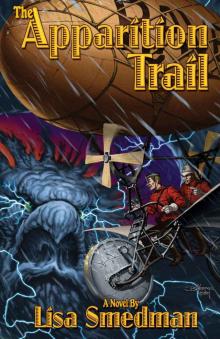 Apparition Trail, The
Apparition Trail, The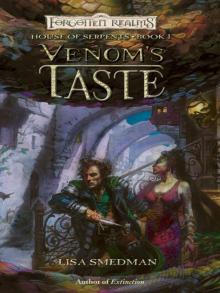 Venom's Taste
Venom's Taste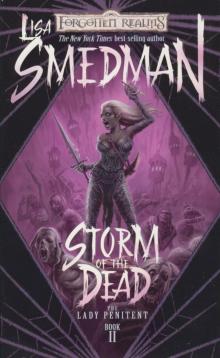 Forgotten Realms - The Lady Penitent - Storm of the Dead
Forgotten Realms - The Lady Penitent - Storm of the Dead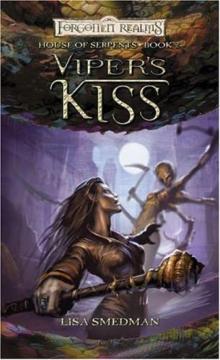 Viper's kiss hos-2
Viper's kiss hos-2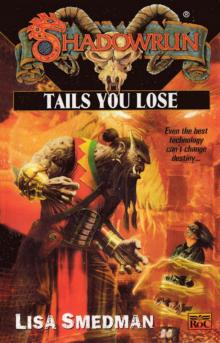 Tails You Lose
Tails You Lose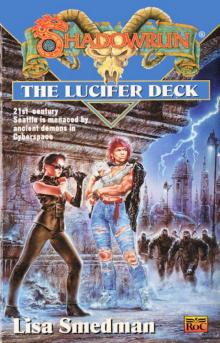 The Lucifer Deck
The Lucifer Deck Vor: The Playback War
Vor: The Playback War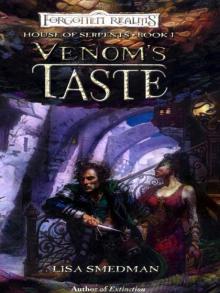 Forgotten Realms - House of Serpents 1 - Venom's Taste
Forgotten Realms - House of Serpents 1 - Venom's Taste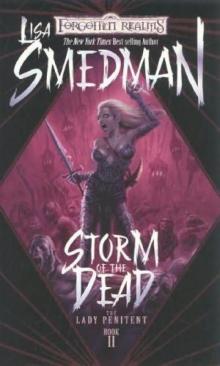 Storm of the Dead зкp-2
Storm of the Dead зкp-2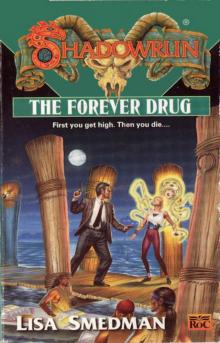 The Forever Drug
The Forever Drug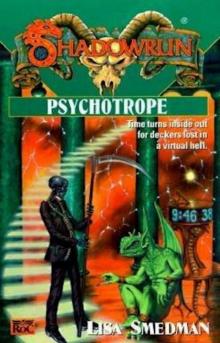 Psychotrope
Psychotrope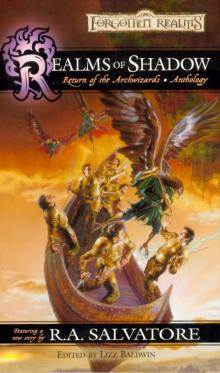 Realms of Shadow a-8
Realms of Shadow a-8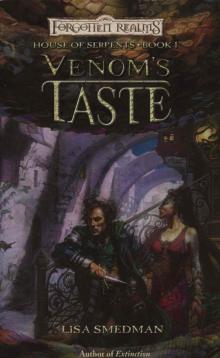 Venom’s Taste hos-1
Venom’s Taste hos-1 Psychotrope s-33
Psychotrope s-33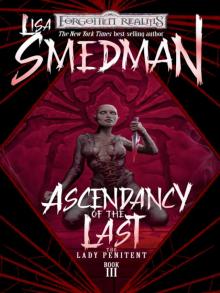 Ascendency of the Last
Ascendency of the Last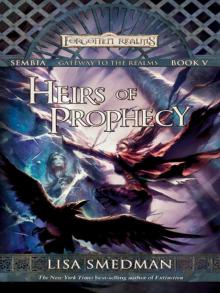 Heirs of Prophecy
Heirs of Prophecy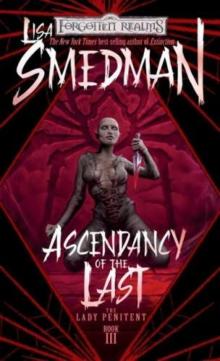 Ascendancy of the Last зкp-3
Ascendancy of the Last зкp-3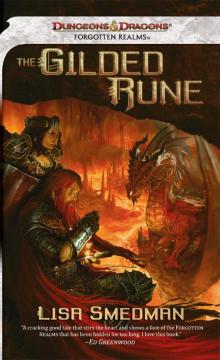 The Gilded Rune (forgotten realms)
The Gilded Rune (forgotten realms)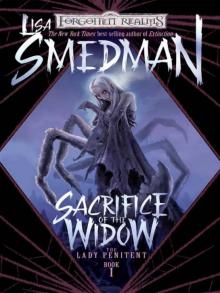 Sacrifice of the Widow: Lady Penitent, Book I
Sacrifice of the Widow: Lady Penitent, Book I The Lucifer desk s-23
The Lucifer desk s-23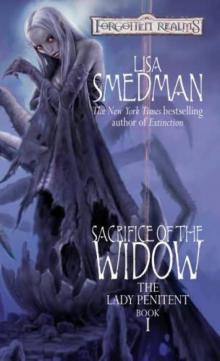 Sacrifice of the Widow lp-1
Sacrifice of the Widow lp-1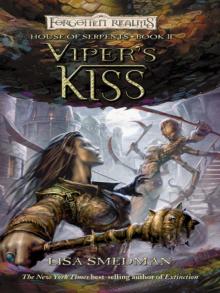 Viper's Kiss
Viper's Kiss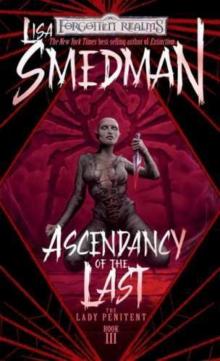 Forgotten Realms - The Lady Penitent - Ascendancy of the Last
Forgotten Realms - The Lady Penitent - Ascendancy of the Last